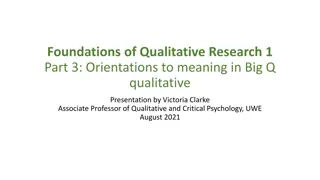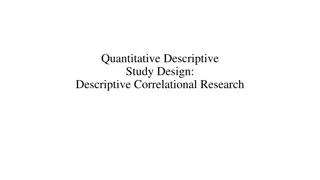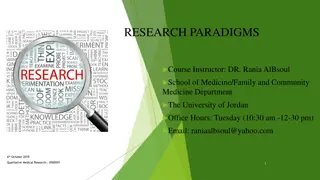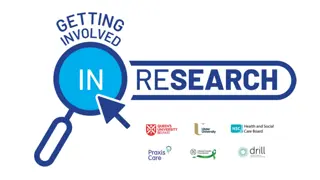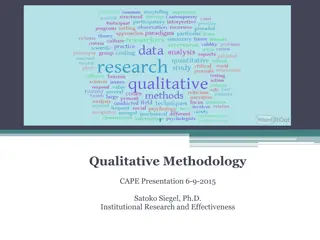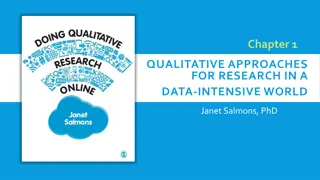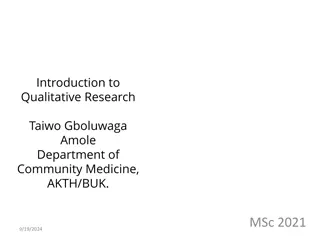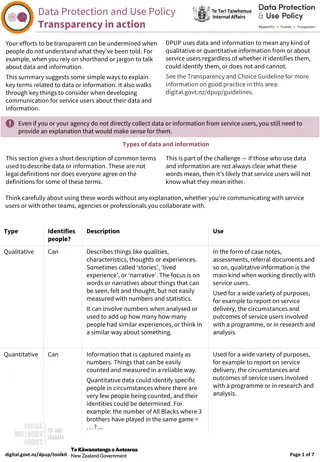Understanding the Differences Between Qualitative and Quantitative Research Methods
Qualitative research aims to understand social phenomena, while quantitative research tests hypotheses and focuses on cause and effect. Mixed methods combine both approaches for a stronger analysis. Researchers play different roles and use distinct methods and analysis techniques in each type of research.
Download Presentation

Please find below an Image/Link to download the presentation.
The content on the website is provided AS IS for your information and personal use only. It may not be sold, licensed, or shared on other websites without obtaining consent from the author. Download presentation by click this link. If you encounter any issues during the download, it is possible that the publisher has removed the file from their server.
E N D
Presentation Transcript
eSTEeM Workshop An introduction to qualitative analysis 22nd May 2019 Clem Herman eSTEeM Director
Quantitative & Qualitative research Laubschagne (2003) For many scientists used to doing quantitative studies the whole concept of qualitative research is unclear, almost foreign, or 'airy fairy' - not 'real' research . 12/11/2024
Quantitative & Qualitative research Laubschagne (2003) For many scientists used to doing quantitative studies the whole concept of qualitative research is unclear, almost foreign, or 'airy fairy' - not 'real' research . Quantitative research usually aims to test hypotheses, look at cause and effect, and make predictions - answers questions such as How many? What? When? Qualitative research aims to understand and interpret social phenomena and interactions - answers questions such as Why? How? 12/11/2024
Mixed methods in SoTL In reality most SoTL projects rely on a mixed methods approach uses both quantitative and qualitative data collection and analysis in an effort to combine the advantages of both types of data. allows a triangulation of evidence and methods that provide a stronger logical case in drawing conclusions The key to triangulation is to see the same thing from different perspectives and thus to be able to confirm or challenge the findings of one method with those of another (Laws 2003) 12/11/2024
Main differences between qual. and quant. research Quantitative Qualitative numerical, measurable data generally non-numerical data (words/images) clearly stated questions, extraneous variable controls exploratory questions, extraneous variables not controlled large samples small sample size generalisability difficult to replicate or generalise experiments, RCTs, large surveys, measurements/instruments, questionnaires interviews, observations, focus groups, field notes, workshops role of researcher: detached, non-biased role of researcher: involved, personal beliefs influence the research statistical analysis interpretive and descriptive analysis final report: comparisons of means and statistical significance of findings final report: narrative report with contextual description and direct quotes from participants 12/11/2024
Sources of qualitative data Free text responses in surveys Case studies Interviews face to face/ phone or Skype (structured, semi-structured or unstructured) Focus groups Emails, forum postings, discussion comments Direct observations (face to face or online) may also be recorded (video/audio) Secondary data archive data and institutional reports Diaries, logs, critical incidents 12/11/2024
ACTIVITY 20 mins in small groups Discuss your experience/ expectations of qualitative analysis Introductions Are you a beginner/ novice/ or have some experience? Do you have data that you have already collected? What are these? Who is going to analyse the data? You, the team? Are there other forms of data that you are collecting? What are you hoping to find out? What are you main concerns about qualitative analysis? 12/11/2024
Demystifying the jargon Thematic analysis A theme captures something important about the data in relation to the research question, and represents some level of patterned response or meaning within the data set. Content analysis Grounded theory strictly speaking this should lead to theory building, but most people use it to mean the same as thematic analysis Discourse Analysis looks more closely at the language used, silences and gaps, what is not said, and interpretive repertoires In all of these we are looking for themes that emerge across the whole data set, rather than in just one interview Narrative Analysis focus on identifying stories or narratives across the interview for example life course or biographical studies. Can use in case studies. 8
Phases of Thematic Analysis 1. Familiarising yourself with your data: Transcribing data (if necessary), reading and re- reading the data, noting down initial ideas. 2. Generating initial codes: Coding interesting features of the data in a systematic fashion across the entire data set, collating data relevant to each code. Collating codes into potential themes, gathering all data relevant to each potential theme. 3. Searching for themes: 4. Reviewing themes: Checking in the themes work in relation to the coded extracts (Level 1) and the entire data set (Level 2), generating a thematic map of the analysis. Ongoing analysis to refine the specifics of each theme, and the overall story the analysis tells; generating clear definitions and names for each theme. The final opportunity for analysis. Selection of vivid, compelling extract examples, final analysis of selected extracts, relating back of the analysis to the research question and literature, producing a scholarly report of the analysis. 5. Defining and naming themes: 6. Producing the report: 9
Whose knowledge? We have moments of illumination. Things come together . The problem is that we could be wrong research evidence shows that people (researchers included) habitually tend to overweight facts they believe in or depend on.. We do this by differentially weighting information and by looking at part of the data not all of them (Miles and Huberman 1994) 10
Whose knowledge? We have moments of illumination. Things come together . The problem is that we could be wrong research evidence shows that people (researchers included) habitually tend to overweight facts they believe in or depend on.. We do this by differentially weighting information and by looking at part of the data not all of them (Miles and Huberman 1994) Researchers who do not explore how their personal, professional and social histories influence how they frame their research will inevitably reproduce dominant gender, race, and class biases (Naples, 2003, p. 3). Interviews should therefore be conversations in which researcher and participant collaborate as partners in the research, with the researcher actively involved in the interview. (Harding 2018) 11
Whose knowledge? Epistemology asks who can be knowers, what is knowledge and what kinds of things can be known. Feminists entry into research shattered prevailing presumptions of the universality and objectivity of the (masculine) physical and social sciences. For example, Donna Haraway's Primate visions (1989) destabilised primatology through showing how masculine primatologists projected their own understanding of (human) masculinity onto the great apes. 14
Analysis getting started Creating your codes - deductive and/ or inductive Pre designed and/ or created as you go a mix is good When to start analysis best start while you are still interviewing, don t wait till they are all done Importance of the pilot checking you have asked the right questions Iterative process adjust and regroup the codes, go back to the data and re-code. Saturation when you know you have done enough and the same things are being repeated 15
Do I need Nvivo? Useful for large data sets Keep track of multiple documents Sharing data with a team Ensuring consistency and reliability Visualise connections Create and manage coding categories Can analyse different types of media and wide range of documents 16
Analysis reliability There are three types of reliability (Campbell et al 2013) One is stabilitywhere the concern is whether a coder s use of codes changes over time. Second is accuracy where a gold standard coding scheme is already established with high reliability and other coding schemes are developed and compared to it. Third is reproducibility across coders often called intercoder reliability where the concern is whether different coders would code the same data the same way. 18
ACTIVITY 20 mins in small groups It s not words that matter, but their meaning (Bell 2005) Codes are tags or labels used for assigning units of meaning to the descriptive or inferential information compiled during a study. Codes are usually attached to chunks of varying size words, phrases, sentences or whole paragraphs, connected or unconnected to a specific setting (Miles and Huberman 1994) An important question to address in terms of coding is what counts as a pattern/theme, or what size does a theme need to be? (Braun & Clarke 2006) Using the text provided, work first individually to highlight key phrases/ emergent codes. (10 minutes) Then as a group discuss the differences/ similarities in how you have marked these. (10 minutes) 12/11/2024
Further reading Braun, V., & Clarke, V. (2006). Using thematic analysis in psychology. Qualitative research in psychology, 3(2), 77-101. Campbell et al (2013) Coding In-depth Semistructured Interviews: Problems of Unitization and Intercoder Reliability and Agreement Sociological Methods & Research 42(3) 294-320 Haraway, D. (1988) Situated Knowledges: The Science Question in Feminism and the Privilege of Partial Perspectives , in Feminist Studies, pp. 575 599 Harding, N. (2019) Feminist Methodologies In: The SAGE Handbook of Qualitative Business and Management Research Methods: History and Traditions DOI: https://dx.doi.org/10.4135/9781526430212 Harding, S. (2016). Whose science? Whose knowledge?: Thinking from women's lives. Cornell University Press. Laubschagne, A. (2003). Qualitative research - Airy fairy or fundamental? The Qualitative Report [Electronic Version], 8(1). Miles, M.B., & Huberman, A.M. (1994). Qualitative Data Analysis: An Expanded Sourcebook. Second Edition. Thousand Oaks, Calif.: Sage Publications. Mouter N. and Vonk Noordegraaf D.M. (2012) Intercoder reliability for qualitative research - You win some, but do you lose some as well? Delft University of Technology, Delft. 22




